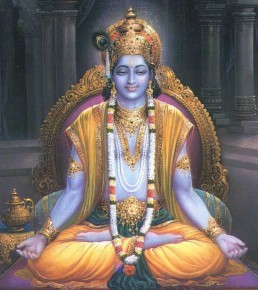Swami Chinmayananda
Swami Chinmayananda Commentary
The “action” of the ‘passionate’ (Rajasic) is that which is undertaken to win one’s desires with an extremely insistent “I-act” mentality. Always such undertakings are works of heavy toil involving great strain, and all the consequent physical fatigue and mental exhaustion. The individual is impelled to act and struggle by a well-defined and extremely arrogant ego-sense. He works, generally under tension and strain, since he comes to believe that he alone can perform it and nobody else will ever help him. All the time he is exhausted with his own anxieties and fears at the thought whether his goal will ever be achieved, if at all. When an individual works thus with an arrogant ego, and with all its self-centredness, he becomes restless enough to make himself totally exhausted and completely shattered. Such “actions” belong to the category of the passionate (Rajasic).
All activities of political leaders, social workers, great industrialists, over-anxious parents, fanatic preachers, proselytising missionaries and blind money-makers, when they are at their best, are examples of this type.
THE CHARACTERISTIC FEATURES OF ACTIONS OF THE “DULL TYPE” ARE DESCRIBED HEREUNDER:
Adi Sankara Commentary
But tat, that; karma, action; udahrtam, is said to be; rajasam, born of rajas; yat, which; is kriyate, done; kamepsuna by one desirous of results; va, or; saahankarena, by one who is egotistic; and bahulaayasam, which is highly strenuous, accomplished by the agent with great effort. ‘Egotistic’ is not used in contrast to knowledge of Truth. What then? It is used in contrast to the absence of egotism in an ordinary person versed in the Vedic path. For in the case of the knower of the Self, who is not egotistic in the real sense, there is no question of his being desirous of results or of being an agent of actions requiring great effort. Even of actions born of sattva, the agent is one who has not realized the Self and is possessed of egoism; what to speak of actions born of rajas and tamas! In common parlance, a person versed in the Vedic path, even though not possessing knowledge of the Self, is spoken of as being free from egotism thus-‘This Brahmana is free from egotism’. Therefore, ‘sahan-karena va’ is said in contrast to him only. Punah (again) is used to complete the meter.
The Bhagavad Gita with the commentary of Sri Sankaracharya – Translated by Alladi Mahadeva Sastry
Holy Geeta – Commentary by Swami Chinmayananda
The Bhagavad Gita by Eknath Easwaran – Best selling translation of the Bhagavad Gita
The Bhagavad Gita – Translation and Commentary by Swami Sivananda
Bhagavad Gita – Translation and Commentary by Bhaktivedanta Swami Prabupadha
Srimad Bhagavad Gita Chapter 18 – Verse 24 – 18.24 yattu kamepsuna – All Bhagavad Gita (Geeta) Verses in Sanskrit, English, Transliteration, Word Meaning, Translation, Audio, Shankara Bhashya, Adi Sankaracharya Commentary and Links to Videos by Swami Chinmayananda and others – 18-24

